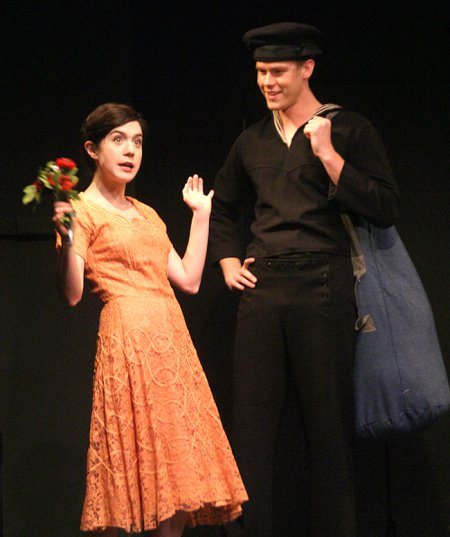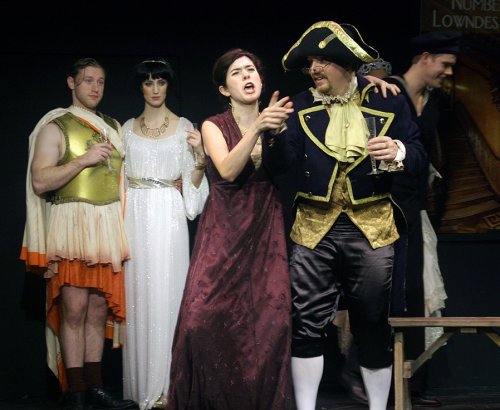Hoi Polloi
World premiere of previously unproduced musical by Noel Coward is a tribute to London with some well-known songs and some unfamiliar ones.

Katrina Michaels and Johnny Wilson in a scene from “Hoi Polloi” (Photo credit: Michael Portantiere)
[avatar user=”Victor Gluck” size=”96″ align=”left” ] Victor Gluck, Editor-in-Chief[/avatar]Musicals Tonight! has its first world premiere in its full production of the recently edited Barry Day edition of Noel Coward’s unproduced 1949 musical, Hoi Polloi. While nine of the songs and some of the characters ended up in Coward’s 1950 night-club/gangster musical, Ace of Clubs, that show never received a New York production due to poor London reviews. Two songs will be familiar to those who know Coward’s 1960’s musicals, Sail Away and The Girl Who Came to Supper, while some will be known to those who have heard Coward’s own recordings of his nightclub act, as well as Coward’s famous W.W. II, “London Pride.” Unfortunately, Mindy Cooper’s production does not make a case for the pleasant though slight Hoi Polloi as any lost masterpiece.
Although Coward’s reputation was as a sophisticated, upper-class author he did deal successfully with the working class in his stage plays Cavalcade and This Happy Breed, both of which were popular in famous film versions. Hoi Polloi (which means ordinary or common people) attempts to put on stage the post-World War II working class who were trying to cheer each other up amid the devastation of the London Blitz. The thin story, which makes use of the premise of the ever popular American musical, On the Town, but in a British setting, concerns manicurist Pinkie Macklin who on her day off shopping at Covent Garden Market meets sailor Harry Hornby, all alone on a 24–hour pass and not knowing anyone in London.

Conor M. Hamill, Oakley Boycott, Katrina Michaels, Ian MacDonald and Johnny Wilson in a scene from “Hoi Polloi” (Photo credit: Michael Portantiere)
Pinkie offers to show Harry around and they visit her parents’ home in Stepney, go to see the changing of the guard at Buckingham Palace, and row a boat on the Serpentine in Hyde Park. Along the way they continually meet up with upper-class Linda and Julian Curtis who bought roses from Pinkie that morning at Covent Garden. When they are invited to their fancy dress party that evening in posh Lowndes Square, Pinkie and Harry have their first row about whether or not they will fit in with the Curtises’ crowd, and it looks like they may part forever. However, Harry realizes he is love with Pinkie and goes to look for her and arrange to attend the party.
At this vantage point, the tour of London plot seems trite and Coward’s characters are paper thin. Both the Buckingham Palace and Hyde Park sites now seem like the merest clichés to take a tourist to on their first day in London. The cast’s British accents vary all over the place, and although “Harry Hornby”’s name suggests that several of the characters should speak Cockney and drop their haitches, there is not much evidence of that. Many of the unfamiliar songs are extremely prosaic, while such famous songs as “Sail Away” and “London Pride” do not register as they should. The musical staging does not come into its own until the catchy second act trio, “London Is A Little Bit of All Right,” (which won Tessie O’Shea the Tony Award when she sang it in the 1963 The Girl Who Came to Supper, and the delightful sextet, “Chase Me, Charlie (Over the Garden Wall).”

Kaitlyn Frotton, Tom Gamblin, Deb Cardona and Josh Bardier in a scene from “Hoi Polloi” (Photo credit: Michael Portantiere)
The cast seems to have been chosen more as actors who sing than singers who act. Aside from the fact that the British accents vary and waver throughout the evening, the characters who are obviously intended to be Cockney or East End Londoners have very minimal accents. A dialect coach would have helped immeasurably. Katrina Michaels and Johnny Wilson are charming as the young lovers who don’t realize they have fallen for each other but as written the parts are not able to carry the show. Conor M. Hamill and Oakley Boycott are successful at creating the upper class Curtises but the book of the musical tells us almost nothing about them.
As Pinkie’s mother Fanny, Deb Cardona is a colorful character, but Tom Gamblin as her father Charlie is extremely bland. Marci Reid is the strongest character as flower seller Barmey Flo, while Ian MacDonald is very weak as her partner Capper. As Pinkie’s prudish and fearful sister Doreen, Kaitlyn Frotton is amusing as a wet blanket, but could go a great deal further than she dares to get her laughs, while her brother Alfie played by Josh Bardier is probably intended for a child actor rather than an adult.

Tom Gamblin, Ian MacDonald and Marci Reid in a scene from Noel Coward’s “Hoi Polloi” (Photo credit: Michael Portantiere)
As arranged and accompanied by David B. Bishop, the musical numbers do not take off until the second act production numbers, “London is a Little Bit of All Right” and “Chase Me, Charlie.” Gamblin, Mcdonald and Reid (two in full drag) put over the witty pattern song, “Three Theatrical Dames” as Dames Rosie, Margaret and Laura, but the song seems to be entirely extraneous to the action of the plot. The justly famous, “London Pride,” a second British national anthem during W.W.II, used as the finale is strangely pallid and lackluster. The thin musical score, like the book, seems to need some amplification in the way of more instruments and more elaborate orchestrations. Cooper’s minimal choreography does not add appreciably to putting over the songs. The one completely successful element are the many costumes from designer Tristan Raines, particularly those for the Curtises’ costume party.
Hoi Polloi was Coward’s tribute to the London working class that was trying to get back on its feet after the devastation of World War II. Partly out of his element and partly as Coward never saw the show in production, both the book and the score seem like part of a first draft which needs to be fleshed out. Mindy Cooper’s tame production with a hard-working cast of ten seems at best second-rate Coward rather than any unjustly lost rediscovery. The Master may have realized that he had not solved his story’s problems.
Hoi Polloi (through November 13, 2016)
Musicals Tonight!
The Lion Theatre on Theatre Row, 410 West 42nd Street, in Manhattan
For tickets, call 212-239-6200 or visit http://www.musicalstonight.org
Running time: two hours and ten minutes including one intermission






Leave a comment